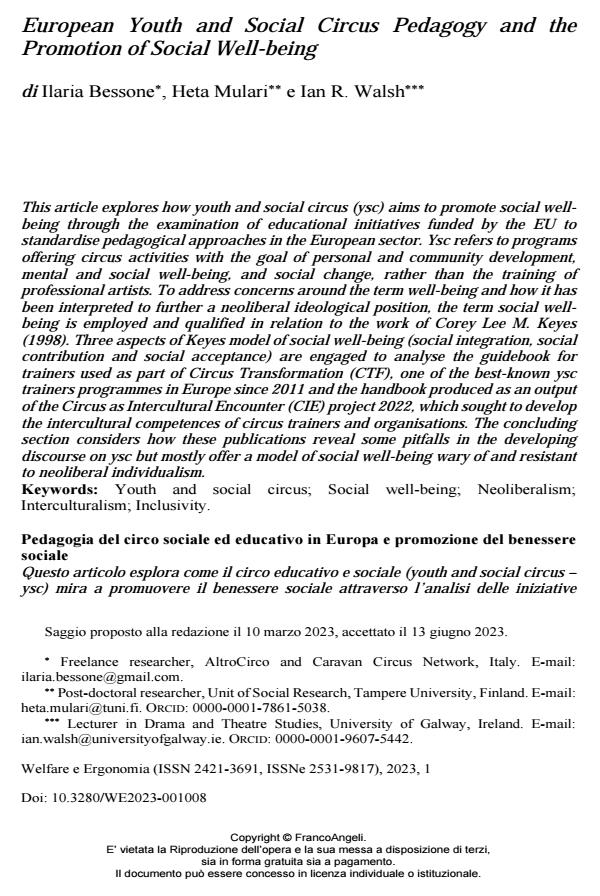European Youth and Social Circus Pedagogy and the Promotion of Social Well-being
Journal title WELFARE E ERGONOMIA
Author/s Ilaria Bessone, Heta Mulari, Ian R. Walsh
Publishing Year 2023 Issue 2023/1 Language English
Pages 11 P. 97-107 File size 319 KB
DOI 10.3280/WE2023-001008
DOI is like a bar code for intellectual property: to have more infomation
click here
Below, you can see the article first page
If you want to buy this article in PDF format, you can do it, following the instructions to buy download credits

FrancoAngeli is member of Publishers International Linking Association, Inc (PILA), a not-for-profit association which run the CrossRef service enabling links to and from online scholarly content.
This article explores how youth and social circus (ysc) aims to promote social well-being through the examination of educational initiatives funded by the EU to standardise pedagogical approaches in the European sector. Ysc refers to programs offering circus activities with the goal of personal and community development, mental and social well-being, and social change, rather than the training of professional artists. To address concerns around the term well-being and how it has been interpreted to further a neoliberal ideological position, the term social well-being is employed and qualified in relation to the work of Corey Lee M. Keyes (1998). Three aspects of Keyes model of social well-being (social integration, social contribution and social acceptance) are engaged to analyse the guidebook for trainers used as part of Circus Transformation (CTF), one of the best-known ysc trainers programmes in Europe since 2011 and the handbook produced as an output of the Circus as Intercultural Encounter (CIE) project 2022, which sought to develop the intercultural competences of circus trainers and organisations. The concluding section considers how these publications reveal some pitfalls in the developing discourse on ysc but mostly offer a model of social well-being wary of and resistant to neoliberal individualism.
Keywords: Youth and social circus; Social well-being; Neoliberalism; Interculturalism; Inclusivity.
- Albanesi C., Cicognani E. and Zani B. (2007). Sense of community, civic engagement and social well-being in Italian adolescents. Journal of Community & Applied Social Psychology, 17(5): 387-406.
- AltroCirco (2020). Manifesto del Circo Sociale in Italia. -- Available from: https://www.altrocirco.it/wpcontent/uploads/2015/10/MANIFESTO-Circo-Sociale-AltroCirco-2020-nov.pdf.
- Bessone I. (2021). Circus Training in the Time of Coronavirus. Performance Research 25(8): 47-55. DOI: 10.1080/13528165.2020.1930781
- Bessone I. (2017). Social Circus as an Organised Cultural Encounter Embodied Knowledge, Trust and Creativity at Play. Journal of Intercultural Studies, 38(6): 651-664. DOI: 10.1080/07256868.2017.1379962
- Bortoleto M., Ross J.J., Houser N. and Kriellaars D. (2022). Everyone is welcome under the big top: a multiple case study on circus arts instruction in physical education. Physical Education and Sport Pedagogy, 1-12. DOI: 10.1080/17408989.2022.2153820
- Bourdieu P. (1984). Distinction. London: Routledge.
- Caravan Circus Network (2022). Circus as Intercultural Encounter Guidebook. -- Available from: https://www.caravancircusnetwork.eu/wp-content/uploads/2023/01/Guidebook-Caravan-FINAL-Web-Planches-min.pdf.
- Caravan Circus Network (2014). Circus TransFormation. A guidebook for social circus trainers. -- Available from: https://www.caravancircusnetwork.eu/wp-content/uploads/media/CTF-Guidebook.pdf.
- Cicognani E. (2014). Social Well-being. In: Michalos A.C., editor, Encyclopedia of Quality of Life and Well-being Research. Dordrecht, NL: Springer, 6193-6197. DOI: 10.1007/978-94-007-0753-5_2797
- Crouch C. (2022). Reflections on the COVID moment and life beyond neoliberalism. Transfer: European Review of Labour and Research, 28(1): 31-45. DOI: 10.1177/10242589221078125
- Csikszentmihalyi M. (1975). Beyond Boredom and Anxiety. San Francisco: Jossey-Bass.
- Davies W. (2011). The Political Economy of Unhappiness. New Left Review, 71: 65-80.
- Gilchrist P. and Wheaton B. (2011). Lifestyle Sport, Public Policy and Youth Engagement: Examining the Emergence of Parkour. International Journal of Sport Policy and Politics, 3(1): 109-131.
- Harvey D. (2007). Neoliberalism as Creative Destructive. The Annals of the American Academy of Political and Social Science, 610: 22-44.
- Helne T. (2021). Well-being for a better world: The contribution of a radically relational and nature-inclusive conception of well-being to the sustainability transformation. Sustainability: Science, Practice and Policy, 17(1): 220-230.
- Hermann C. and Mahnkopf B. (2010). Still a Future for the European Social Model?. Global Labor Journal, 1(3): 314-330.
- Keyes C.L.M. (1998). Social Well-being. Social Psychology Quarterly, 61(2): 121-140.
- Low K. (2017). Understanding Health, Wellbeing, the Millennium Development Goals and Health Inequities. In: Baxter V. and Low K.E., editors, Applied Theatre: Performing Health and Wellbeing. London: Bloomsbury.
- Pilkington M. (2016). Well-being, happiness and the structural crisis of neoliberalism: An interdisciplinary analysis through the lenses of emotions. Mind & Society, 15(2): 265-280.
- Shapiro R. (2004). The Aesthetics of Institutionalization: Breakdancing in France. The Journal of Arts Management, Law, and Society, 33(4): 316-335.
- Sointu E. (2005). The rise of an ideal: Tracing changing discourses of wellbeing. The Sociological Review, 53(2): 255-274.
- Sorzano O.L. (2018). Is Social Circus the ‘Other’ of Professional Circus?. Performance Matters, 4(1-2): 116-133.
- Spiegel J.B. (2016). Social Circus: The Cultural Politics of Embodying ‘Social Transformation’. TDR: The Drama Review, 60(4): 50-67.
- Spiegel J.B. and Choukroun B.O., editors (2019). The Art of Collectivity: Social Circus and the Cultural Politics of a Post-Neoliberal Vision. Montreal: McGill-Queen’s University Press.
Ilaria Bessone, Heta Mulari, Ian R. Walsh, European Youth and Social Circus Pedagogy and the Promotion of Social Well-being in "WELFARE E ERGONOMIA" 1/2023, pp 97-107, DOI: 10.3280/WE2023-001008